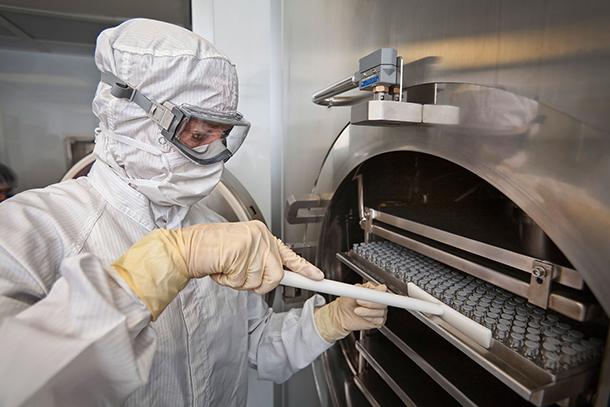USC researchers have developed a polio vaccine that doesn’t require refrigeration, meaning it could someday be used all over the world to deliver the final blow to this longtime foe.
The vaccine, which was freeze-dried into a powder, kept at room temperature for four weeks and then rehydrated, offered full protection against the polio virus when tested in mice.
“Stabilization is not rocket science, so most academics don’t pay much attention to this field,” said the study’s first author, Woo-Jin Shin, a fellow in the lab of Jae Jung, chair of the Department of Molecular Microbiology and Immunology at the Keck School of Medicine of USC. “However, no matter how wonderful a drug or vaccine is, if it isn’t stable enough to be transported, it doesn’t do anyone much good.”
The study appears in the Nov. 27 issue of the journal mBio.
Polio is on the brink of complete eradication, with just 22 reported cases worldwide in 2017. The highly infectious disease, which causes lifelong paralysis and disability mostly in young children, is a fading memory in many places. Yet in countries where vaccination rates are spotty, young children are at risk.
The biggest hitch to complete eradication has been creating a temperature-stable vaccine for use in developing countries where refrigeration may be unavailable. Recent polio cases have been reported in Nigeria, Papua New Guinea, Syria and Pakistan.
Other freeze-dried vaccines
In the United States, the polio epidemic reached its height in the 1950s. In 1957, mass immunization brought the annual number of cases down from 58,000 to 5,600. Since 1979, no cases of polio have originated in the United States.
By removing moisture through freeze-drying, researchers have created temperature-stable vaccines for measles, typhoid and meningococcal disease. But scientists haven’t been able to make a polio vaccine that retains potency through freeze-drying and rehydration.
Shin and his colleagues used two lab techniques — liquid chromatography and high-throughput screening — that allowed them to analyze a high volume of ingredients and formulations until they found one that worked.
Jung’s hope is that a foundation or company will take over the project to pay for human studies and bring the injectable vaccine onto the market.
In addition to Shin, the study’s authors are Daiki Hara and Jae Jung of the Keck School of Medicine, and Francisca Gbormittah, Hana Chang and Byeong S. Chang of Integrity Bio, a company that specializes in biologics — medicines made from substances found in living things.
Back story: During dinner three years ago, Jung and his college buddy Chang, CEO of Integrity Bio, decided to bring together Jung’s virology expertise with Chang’s expertise in stabilization. Chang paid Shin’s salary, and Jung provided supplies.
“He and I decided to do this as we are getting old and we need to directly contribute to human health and life,” Jung said. “Creative ideas always start with food and drinks.”
— Leigh Hopper


